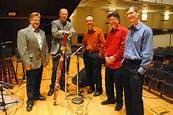Icarus Ensemble flies high at the Jazz Kitchen, offering samples of its forthcoming CD
You can depend upon a jazz group like Icarus Ensemble to grow artistically as a matter of course: Its members have such a wide range of musical influences and active involvement with the classical tradition that the quintet's continuing creativity is assured.
The band's internal rapport naturally grows with experience together, even though they are pulled in many other directions as teachers and performers (three of them as members of the Indianapolis Symphony Orchestra). In a generous first set Monday night at the Jazz Kitchen, Icarus sounded better than ever.
The five musicians are trained in preparing concerts conscientiously. But what's more important to convey a genuine jazz feeling is an informality and spontaneity that can advance the collegial conversation.
After the group's pianist, Gary Walters, opened with a solo tribute to the late Cynthia Layne ("Sophisticated Lady"), that ensemble meld of precision and looseness was immediately apparent in a relaxed Walters original, "Oopsy Daisy."
The group's compositional profile — the Theme from "Black Orpheus" was the set's only non-original —is conspicuously three-dimensional. The witty asperity of "Schizoid" emphasized qualities in the solo playing of its composer, Mark Ortwein, who brought both electric bassoon and soprano sax into intense play during the set.
"Widow's Walk," the penultimate piece, opened with an intriguing violin cadenza by Dean Franke that quoted (according to my son, William) Heinrich Biber's path-breaking passacaglia, then moved to a delightful climax as Ortwein suggested rock-guitar shredding on his plugged-in bassoon. "Widow's Walk" also included Jon Crabiel's well-constructed percussion solo, which was notable for its incorporation of smooth pianissimo rolls.
The set finale put on display the amiable muse of Peter Hansen, the group's bassist, who opened his "Groovin' 2.0" with a long solo, assembled from short bits by the miracle of electronics. That piece, as well as his "Merry-Go-Round" and the set-closing "Circle Dance," showed his compositional chops to be in order and cunningly conceived for Icarus' strengths (even though the latter began life as a work for the Ronen Ensemble).
The richness, variety, unfussy structure, and sense of fun communicated by this band raises high hopes for the long-anticipated recording it will release officially in its March 8 return to the Jazz Kitchen.
 |
| Mark Ortwein (from left), Peter Hansen, Deane Franke, Gary Walters, Jon Crabiel |
The band's internal rapport naturally grows with experience together, even though they are pulled in many other directions as teachers and performers (three of them as members of the Indianapolis Symphony Orchestra). In a generous first set Monday night at the Jazz Kitchen, Icarus sounded better than ever.
The five musicians are trained in preparing concerts conscientiously. But what's more important to convey a genuine jazz feeling is an informality and spontaneity that can advance the collegial conversation.
After the group's pianist, Gary Walters, opened with a solo tribute to the late Cynthia Layne ("Sophisticated Lady"), that ensemble meld of precision and looseness was immediately apparent in a relaxed Walters original, "Oopsy Daisy."
The group's compositional profile — the Theme from "Black Orpheus" was the set's only non-original —is conspicuously three-dimensional. The witty asperity of "Schizoid" emphasized qualities in the solo playing of its composer, Mark Ortwein, who brought both electric bassoon and soprano sax into intense play during the set.
"Widow's Walk," the penultimate piece, opened with an intriguing violin cadenza by Dean Franke that quoted (according to my son, William) Heinrich Biber's path-breaking passacaglia, then moved to a delightful climax as Ortwein suggested rock-guitar shredding on his plugged-in bassoon. "Widow's Walk" also included Jon Crabiel's well-constructed percussion solo, which was notable for its incorporation of smooth pianissimo rolls.
The set finale put on display the amiable muse of Peter Hansen, the group's bassist, who opened his "Groovin' 2.0" with a long solo, assembled from short bits by the miracle of electronics. That piece, as well as his "Merry-Go-Round" and the set-closing "Circle Dance," showed his compositional chops to be in order and cunningly conceived for Icarus' strengths (even though the latter began life as a work for the Ronen Ensemble).
The richness, variety, unfussy structure, and sense of fun communicated by this band raises high hopes for the long-anticipated recording it will release officially in its March 8 return to the Jazz Kitchen.



Comments
Post a Comment